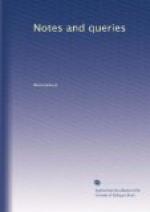In reply to one of the Queries of “W.” (No. 24. p. 383.), I transcribe from the MSS. of Mr. Chewning Blackmore, a Presbyterian minister of Worcester, the “Lines on London Dissenting Ministers of a former Day,” which I have never seen entire in print:—
“Behold how Papal Wright with lordly
pride
Directs his haughty eye to either
side,
Gives forth his doctrine with imperious
nod,
And fraught with pride addresses
e’en his God.
“Not so the gentle Watts, in him
we find
The fairest pattern of a humble
mind;
In him the meekest, lowliest virtue
dwells,
As mild as light, as soft as ev’ning
gales.
“Tuning melodious nonsense, Bradbury
stands,
With head uplifted and with dancing
hands,
Prone to sedition, and to slander
free,
Sacheverell sure was but a type
of thee.
“Mark how the pious matrons flock
around,
Pleased with the noise of Guyse’s
empty sound;
How sweetly each unmeaning period
flows
To lull the audience to a gentle
doze!
“Eternal Bragge in never-ending
strains
Unfolds the mysteries Joseph’s
coat contains,
Of every hue describes a different
cause,
And from each patch a solemn mystery
draws.
“With soundest judgment and with
nicest skill,
The learned Hunt explains his Master’s
will,
So just his meaning, and his sense
to true,
He only pleases the discerning few.
“In Chandler’s solid, well-composed
discourse,
What wond’rous energy! what
mighty force!
Still, friend to Truth, and strict
to Reason’s rules,
He scorns the censure of unthinking
fools.
“But see the accomplish’d
orator appear,
Refined his language, and his reasoning
dear,
Thou only, Foster, has the pleasing
art,
At once to please the ear and mend
the heart!
“Lawrence, with clear and solid
judgment speaks,
And on the sober mind impression
makes,
The sacred truths with justness
he explains,
And he from ev’ry hearer praise
obtains.”
Of the author of these lines I can give no information. He evidently belonged to the Anti-Calvinistic party. His name does not appear to have been known to Mr. Walter Wilson, the historian of the “Dissenting Churches” of London, although he quotes a portion of them. But they were probably composed between 1728 and 1738. In the former year, Dr. James Foster’s London popularity arose, on the occasion of his undertaking the evening lecture at the Old Jewry. In the year 1738, Mr. Robert Bragge, one of the subjects of the poem, died. Of this gentleman the story is told (and to it the poem evidently alludes), that he was employed no less than four months in developing the mysteries of Joseph’s coat, from Genesis, xxxvii. 3.: “And he made him a coat of many colours.” In reply to the sarcasm on Mr. Bragge, Mr. Walter Wilson states (Hist. and Ant. of Diss. ch. i. p. 247.) that the following stanza was composed:—




